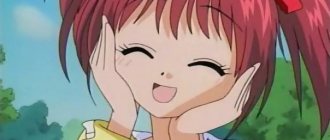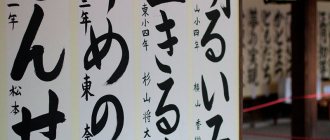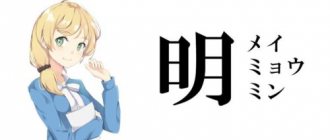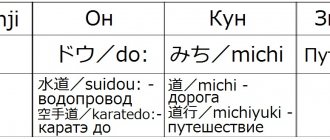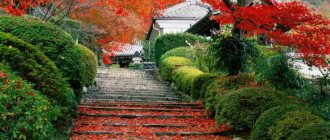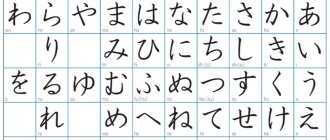- March 24, 2019
- Origin
- Alena Roads
For nineteen centuries of its existence, the common Japanese people had the opportunity to call themselves only by name. They can add a nickname to it for variety, but this is not a requirement. In the aristocratic environment there were wider opportunities, allowing them to add any appropriate surname to their name. Due to the small number of samurai, they had the same powers.
The Japanese do not try to distinguish themselves from Europe and therefore write their last name first and then their first name in the same way. But an attentive observer will notice the differences: in conversations, the Japanese can change their last name and first name. This also manifests itself in writing: they try to write the first name first and the last name second. At the same time, they highlight it with capital letters.
In this article you will learn how Japanese names sound in Japanese.
From the history
In writing, the Japanese name is depicted as one or more hieroglyphs. Sometimes parents try to distinguish themselves by adding katakana or hiragana characters. In 1985, the list of formally permitted characters for writing Japanese names was expanded to include romanji, man'yegana, hentaigana and more familiar European symbols - $, %. In other cases, only hieroglyphs are found.
The interesting thing about the old days is that the common people were the personal property of the emperor. Gradually, to indicate the place of each of them in the functioning of the directory, surnames appeared. If a Japanese distinguished himself and committed a significant act that left a mark on history, he could be given a new name.
Historians suggest that the first surnames appeared after the restoration of Meiji. The upper class ordered the plebeians to come up with a surname for themselves. Some people took surnames from the historical past, others told fortunes or asked priests for help. This fact explains one curious point: in Japan you can find many different surnames that differ from each other not only in spelling, but also in meaning.
How Japanese names are created
The Japanese name is unique. It is expressed in the fact that it is not the name itself that is written, but its meaning. In more detail, a Japanese name consists of several hieroglyphs, each of which has its own meaning. For a complete combination of all components, connecting elements are included, which also mean something. In sum, they form a specific word, although difficult to pronounce, but having a single meaning.
Meaning
Inside any Japanese name certain information is encrypted, which comes in several types:
- regalia and insignia;
- natural phenomena;
- moral principles and respect for human rights;
- numbers and other numerical indicators.
From the first category, we can recall the common endings of many names - 部 - be (a person who practices a certain craft) and 助 - suke (involved in the administration of the armed forces): Yumibe (shooter), Daisuke (excellent assistant) and so on.
The meanings of Japanese names of the second type are names of flowers, names of rocks and caves, animal names, and so on: Hanako (flower child, because 花 - hana - flower).
The third group is the qualities of human character: courage, responsiveness, kindness, and so on (for example, Makoto is honest or Takeshi is strong like bamboo). The fourth is numbers and numbers. So, Ichiro is a Japanese name, translated from Japanese as “first son”, because 郎 - ichi - one.
Japanese names have another interesting feature. One word with a specific meaning can easily change into another from the slightest fluctuation in the intonation of the voice. This also applies to proper names. Although they contain one hieroglyph, it is not always easy to read. For example, 東 - east - with the slightest mistake can become both Higashi and Azuma, that is, two completely different names.
What would your name sound like in Japanese?
Share
Do you want to know what your name is in Japanese?
MEN Alexander - (defender) - Mamoru Alexey - (assistant) - Taske Anatoly - (rise) - Higashi Andrey - (courageous, brave) - Yukio Anton - (competing) - Rikishi Arkady - (happy country) - Shiavakuni Artem - (unharmed , impeccable health) – Anzen Arthur – (big bear) – Okuma Boris – (fighting) – Toshiki Vadim – (proving) – Shomei Valentin – (strong, healthy) – Tsuyoshi Valery – (vigorous, healthy) – Genkito Vasily – (royal ) – Obu Victor – (winner) – Serisha Vitaly – (vital) – Ikiru Vladimir – (lord of the world) – Heyvanushi Vyacheslav – (famous) – Kagayakashi Gennady – (noble, highborn) – Koketsu Georgy – (farmer) – Nofu Gleb – (block, pole) – Burokku Gregory – (awake) – Meosamashi Daniel – (divine judgment) – Kamikoto Demyan – (conqueror, pacifier) – Seifuku Denis – (vital forces of nature) – Shizenryoku Dmitry – (earthly fruit) – Kajitsu Evgeniy – (noble) – Ryoidenshi Egor – (patron of agriculture) – Dzinushi Emelyan – (flattering, pleasant in words) – Kangen Efim – (blessed) – Megumaro Ivan – (grace of God) – Kaminoonto Igor – (militancy, courage) – Yujiro Ilya – (fortress of the Lord) – Yosaishu Cyril – (lord of the sun) – Taiyonoryoschu Constantine – (permanent) – Eizoku Leo – (lion) – Shishio Leonid – (son of the lion) – Shishikyu Maxim – (great) – Mattakushi Michael – (like a god) – Kamizu Nikita - (victorious) - Shorito Nikolai - (victory of people) - Hitonosori Oleg - (light) - Hikaro Pavel - (small) - Shoshi Peter - (stone) - Ishi Roman - (Roman) - Roman Ruslan - (solid lion) – Shishihado Stanislav – (become famous) – Yumeinaru Stepan – (crown, wreath, crown) – Hanawaro Yuri – (creator) – Yarite Yaroslav – (bright glory) – Akarumei
WOMEN Alexandra – (protector) – Mamoka Alice – (from the noble class) – Yoizokumi Alla – (other) – Sonota Anastasia – (resurrected) – Fukkatsumi Anna – (mercy, grace) – Dzihiko Antonina – (spatial) – Sorariko Anfisa – ( blooming) – Kaika, – Sakura Valentina – (strong) – Tsuyoi Varvara – (cruel) – Zankokumi Vasilisa – (royal) – Joteiko Vera – (faith) – Shinkori Victoria – (winner) – Shori Galina – (clarity) – Tomei Daria – (great fire) – Ohiko Eugenia – (noble) – Yoiidenko Ekaterina – (purity, spotlessness) – Koheiri Elena – (solar) – Taiyota Elizabeth – (worshipper of God) – Keikenna Zinaida – (born of God) – Kamigauma Zoya – (life ) – Sei, – Inochi Inna – (stormy stream) – Hayakawa Irina – (peace or anger) – Sekai, – Ikari Karina – (darling) – Kawaimi Kira – (mistress) – Fujinka Claudia – (limping) – Rameyo Ksenia – ( wanderer, stranger) – Horomi Larisa – (seagull) – Kamome Lydia – (sad song) – Nageki Love – (love) – Ay, – Ayumi Lyudmila – (dear to people) – Tanomi Margarita – (pearl) – Shinjuka, – Tamae Marina – (sea) – Maritaimi Maria – (bitter, stubborn) – Nigai Nadezhda – (hope) – Nozomi Natalya – (born, dear) – Umari Nina – (queen) – Quinmi Oksana – (inhospitable) – Aisonaku Olesya – (forest) – Ringyoko Olga – (light) – Hikari Polina – (destroying, destroying) – Hakaina Raisa – (heavenly, light, submissive) – Tenshimi Svetlana – (light) – Hikaru Serafima – (fiery snake) – Honooryumi Snezhana – (snowy) – Yuki, Yukiko Sofia – (wise) – Kashikomi Tamara – (palm tree) – Yashimi Tatyana – (sovereign) – Joshiko Ulyana – (righteous) – Tadashimi Julia – (wavy, fluffy) – Hajoka, Nami Yana – (mercy of God) – Jihiri .
Share this with your loved ones and friends!
Several variations of one name
One Japanese name can be depicted in several ways. The most popular is the use of many types of writing. Today, hiragana, katakana and two variants of writing hieroglyphs (new or outdated) are used for these purposes.
Sometimes, if the parents wish, the child is called one of the few Japanese names, the meaning of which is so rare that it is necessary to use hieroglyphs that have long since fallen into disuse. For these purposes, there is a specific list of 人名用漢字 - Jimmeiye kanji. It contains 862 hieroglyphs designed specifically for composing names. This list regularly interacted with another one that performed opposite functions - 常用漢字表- Jie e kanjihe (hieroglyphs for daily writing). Written signs regularly drifted from one to another, and carriers of not the most positive meaning gradually disappeared from history.
How to put your name on the form?
If you do not know the Japanese language (at least the basic alphabets of Gojuon
" - hiragana and katakana) and there is no one nearby who could do this, then you can take advantage of the following opportunities: 1. - order your name to be applied to the keikogi when purchasing it. This option only works if such a service is provided by the company where you buy the kimono. For example, the Japanese online store Tozando has such an opportunity. 2. - search the web for online translation services of your name into the Japanese katakana alphabet. As a rule, such services are quite accurate, although errors do occur. 3. - write the name yourself using the katakana alphabet itself and the tips that will be given below.
This page shows the COMPLETE katakana alphabet with both basic characters and additional ones that convey those sounds that are not originally in the Japanese language, but when used, the Japanese will be able to read your name with a sufficient degree of correctness.
Popular name variations
Today, unusual names are in demand among the Japanese. Often, in order to write them down, you need to remember the entire system of outdated hieroglyphs. But this is not used by everyone, but only by lovers of similar names. The main reason for this selectivity is that they are more difficult to write than modern characters. An example would be the hieroglyph 国 - kuni, meaning country. Previously, it was written in a completely different form - 國.
Some parents name their child such a complex name that it takes them, and subsequently the child, a long time to remember the spelling of such an original word. But they are ready to endure such difficulties and are not going to give up the outdated letter. There are reasons for this.
One of them is that people are disappointed with the new alphabet. After the introduction of all the reforms, the remaining hieroglyphs were absolutely not enough to record the minimum amount of necessary vocabulary. In addition, no one foresaw how to replace names with a certain information load.
No less important is the influence of traditions, which also contributed to the return of outdated signs. In addition, when written, they look much better than modern hieroglyphs, which also attracts young parents in the process of choosing a name. And we must not forget how ancient clans, along with the Fujiwara, are thriving in Japan. They would not write their last name differently due to outdated hieroglyphs.
Many Japanese people love their history. They respect some characters so much that they are willing to name their children after them. An additional advantage influencing their choice is the beautiful writing of old signs.
Some of the outdated hieroglyphs from which human names were made have remained virtually unchanged - they could not find a suitable copy. As an example, we can cite the character meaning morality - 徳 - toku (present in Tokugawa, Yasunori), the sign 藤 - wisteria (Fujiwara, Saito) and so on. Such hieroglyphs can be found in the personal data of famous characters: 林保徳 - Hayashi Yasunori, 齎藤 - Saito Hajime, and so on.
Among modern Japanese names, the use of old characters and the old kanji spelling, which has acquired current copies, is popular. An example is the sign 鉄 - tetsu, meaning iron. Previously, it was written in a completely different form - 鐵. Under the influence of fashion trends, it acquired additional characteristics: 鐵弥 - tetsuya and 鐵雄 - tetsuo.
Female names
It is unlikely that anyone will argue about the beauty and tenderness of Chinese female names. Most often, parents use concepts such as:
- outer beauty;
- grace;
- compare it to precious stones;
- the beauty of nature;
- emphasize intellectual abilities;
- very common is the interweaving of color names.
When translating from a Russian name, everything is much simpler. Hieroglyphs are selected based on their similarity to the sounds of the original version, without investing any meaning in them. But a hieroglyph, which is usually a monosyllabic word, can mean, for example, the word “beauty” or “joy.”
General information about male Japanese names
Japanese names can consist of one or more components. Words with one component have a verb ending in -u (Mamoru) or an adjective ending in -si (Hiroshi).
One curious feature that occurs among names in Japanese is that there is one character in the entire word. If there are two of these signs, it means that the man deserves to have particularly outstanding features emphasized in his name: son, husband, warrior, etc. Both signs can have different endings.
No less common are cases when an extraneous hieroglyph is included in the name, whose function is reduced to easier reading of the name. Such actions automatically transform a two-digit name into a three-digit one (for example, the youngest son Akira). The second name for such names is two-link. More rare are cases of three-unit names with a successful attempt to preserve one main sign in the composition. Four-character names written using the alphabet, without the participation of hieroglyphs, are considered exceptional.
What does your name actually sound like in Japanese?
Many people are interested not only in the meaning of names, but also in the sound of a name in Japanese or what they would be called if they were born in the Land of the Rising Sun. If one of us moves to Japan, then his name will simply be translated into katakana and will sound approximately the same as here, but with a specific accent. Alternatively, each letter of the Latin alphabet can be substituted with the corresponding hieroglyph, but then you can get what something like “Meshikiarikhikitoka” instead of the name Christina. Yes, it’s hard to believe that in Japan people can name their child that, and they don’t. If you are interested, you can substitute it and see what happens. It turns out quite funny) The most accurate option is to find out the real meaning of your name and translate it into Japanese. Of course, it is worth taking into account the specifics of spelling names (for example, the endings of male and female names), the peculiarities of translation, because often in Japanese there are several analogues of the same word. Male names in Japanese Alexander - (defender) - Mamoru Alexey - (assistant) - Taske Anatoly - (sunrise) - Higashi Andrey - (courageous, brave) - Yukio Anton - (competitive) - Rikishi Arkady - (happy country) - Shiawakuni Artem - (unharmed, impeccable health) - Anzen Arthur - (big bear) - Okuma Boris – (fighting) – Toshiki Vadim – (proving) – Shomei Valentin – (strong, healthy) – Tsuyoshi Valery – (vigorous, healthy) – Genkito Vasily – (royal) – Obu Victor – (winner) – Serisha Vitaly (vital ) – Ikiru Vladimir (ruler of the world) – Heyvanushi Vyacheslav (illustrious) – Kagayakashi Gennady – (noble, well-born) – Koketsu Georgy (farmer) – Nofu Gleb (block, pole) – Burokku Gregory (awake) – Meosamashi Daniel (divine judgment) - Kamikoto Demyan - (conqueror, pacifier) - Seifuku Denis - (vital forces of nature) - Shizenryoku Dmitry (earthly fruit) - Kajitsu Eugene (noble) - Ryoidenshi Egor (patron of agriculture) - Dzinushi Emelyan - (flattering, pleasant in words) - Kangen Efim (blessed) - Megumaro Ivan - (the grace of God) - Kaminooncho Igor - (militancy, courage) - Yujiro Ilya - (fortress of the Lord) - Yosaishu Cyril - (lord of the sun) - Taiyonoryoschu Constantine (permanent) - Eizoku Leo (lion) – Shishio Leonid (son of a lion) – Shishikyu Maxim (great) – Mattakushi Mikhail (like a god) – Kamizu Nikita (victorious) – Shorito Nikolai (victory of people) – Hitonosori Oleg (light) – Hikaro Pavel (small) – Shoshi Peter (stone ) - Ishi Roman (Roman) - Roman Ruslan (solid lion) - Shishihado Tigran (generous man) - Kiretego Sergei (tall, highly respected) - Tattobu Stanislav (become famous) - Yumeinaru Stepan (crown, wreath, crown) - Hanawaro Yuri ( creator) - Yarite Yaroslav (bright glory) - Akarume
Female names in Japanese Alexandra (protector) - Mamoka Alice (from the noble class) - Yoizokumi Alla, Alina (other) - Sonota Anastasia (resurrected) - Fukkatsumi Alzhela (angelic) - Tenshi Anna (mercy, grace) - Jihiko Antonina (spatial) – Sorariko Anfisa (blooming) – Kaika, – Sakura Arina (peace) – Yochiko Valentina (strong) – Tsuyoi Valeria – (vigorous, healthy) – Genki Varvara (cruel) – Zankokumi Vasilisa (royal) – Joteiko Vera (faith) – Shinkori Victoria (winner) - Shori Galina (clarity) - Tomei Daria (great fire) - Ohiko Eva (life, living) - Hova Evgenia (noble) - Yoiidenko Ekaterina (purity, spotlessness) - Koheiri Elena (sunny or bright) - Tayota, — Hikari Elizabeth (who worships God) — Keikenna Zinaida (born of God) — Kamigauma Zoya (life) — Sei — Inoti Inna (stormy stream) — Hayakawa Irina (peace or wrath) — Sekai — Ikari Karina (darling) — Kawaimi Carolina (queen) - Kisai Kira (mistress) - Fujinka Claudia (lame) - Rameyo Christina (Christian, dedicated to Christ) - Noumina Xenia (stranger, stranger) - Horomi Larisa (seagull) - Kamome Lydia (sad song) - Nageki Love (love ) – Ay, – Ayumi Lyudmila (dear to people) – Tanomi Margarita (pearl) – Shinjuka, – Tamae Marina (sea) – Maritaimi Maria (bitter, stubborn) – Nigai Nadezhda (hope) – Nozomi Natalya (born, dear) – Umari Nina (queen) - Queenmi Oksana (inhospitable) - Aisonaku Olesya (forest) - Ringyoko Olga (light) - Hikari Polina (exterminating, destroying) - Hakaina Raisa (paradise, light, submissive) - Tenshimi Ruslana (lioness) - Mejishi Svetlana ( light) – Hikaru Seraphim (flaming snake) – Honooryumi Snezhana (snow) – Yuki, Yukiko Sofia (wise) – Kashikomi Tamara (palm tree) – Yashimi Tatyana (lady) – Joshiko Ulyana (righteous) – Tadashimi Julia (wavy, fluffy) – Hajoka, - Nami Yana (God's grace) - Jihiri I think you found this information interesting! Bye-bye
Examples of boy names and their meaning
A frequently encountered feature of male names is a reflection of how a particular boy was born in the family. To depict this, the suffixes -kazu, -iti (one), -zo (three), -ji (two) are used: first, second or third son. Other values are presented in the table.
| Name | Meaning |
| Akira | Bright |
| Goro | Fifth son |
| Daichi | Wise |
| Isao | Dignity, honor |
| Yori | Servant of the Society |
| Kohaku | Amber |
| Minori | True |
| Nao | Dear |
| Nobuo | Loyal |
| Ryu | Dragon spirit |
| Sora | Sky |
| Takeshi | Warrior |
| Tarot | Eldest son |
| Hachiro | Eighth son |
| Tsutomu | Worker |
| Yutaka | Rich |
| Yasushi | Quiet |
General information about female names
Many name forms common to Japanese women do not have a specific meaning. To depict the necessary qualities, they use the signs -ma (truth), -yu (tenderness), -mi (beauty) and so on. When choosing a similar name, parents are guided by the desire to reward their daughter with the same qualities in adulthood.
Animal and plant names have been popular for some time as Japanese female names. Hieroglyphs denoting a tiger or deer were credited with healing powers. But over time, this fashion has passed, and the names remaining after it are considered obsolete.
Sometimes lovers of such exotic things remember this fashion when choosing a name for their child. Greater preference is given to those hieroglyphs that were used to call plants and flowers: take (bamboo), kiku (chrysanthemum), momo (peach), ine (rice) and so on. Sometimes they are paired with numerals (nana - seven, mi - three), but such cases are rare. These are the consequences of the ancient tradition of giving names with the serial number of birth of a particular child among other children of the same family.
On the territory of this country you can see unusual names that reflect weather phenomena and seasons: yuki (snow), natsu (summer), kumo (cloud) and so on.
No less impressive are names that consist not of the usual hieroglyphs, but with the participation of syllabic alphabet. They differ from other types of writing in that they are written according to one pattern that does not change under the influence of other factors. Those who want to write their name in hieroglyphs take the general meaning of the word and write it using the desired characters.
Japan failed to preserve its culture from the influence of European countries. Over time, the ranks of familiar names were squeezed out, giving way to foreign ones: Emiri, Maria, Rena, and so on.
How to Write Your Name in Japanese
As a rule, the keikogi - 稽古着 (colloquially kimono) of practicing aikido students are marked with personal names written in Japanese.
Names are written on the left sleeve of the keikogi vertically (read from top to bottom) or horizontally (read from left to right). Recording is done using the katakana
, which is particularly used for writing borrowed words and foreign names.
Also, names are written in HAKAMA
on the right side of the back, as well as on the belts.
As a rule, NAME
, although sometimes you can also find a surname.
The name is written on the left sleeve with a permanent marker and then embroidered with thread, or when purchasing a keikogi, you can immediately order your name to be applied to the uniform. Moreover, in this case, you should put the name not on the pants, but also on the belt. This allows you not only to read the name of an aikidoka practitioner during classes, but also to avoid “losing/mixing up” your uniform when washing your uniform in the laundry.
Examples of girls' names and their meaning
Beautiful Japanese names for girls have one notable feature - the use of the endings -ko or -mi. The first ending is fraught with an appeal to a child, the second - admiration for female beauty. Japanese female names and their meanings are presented in the table.
| Names | Meaning |
| Ay | Love |
| Aoi | Blue |
| Arizu | Noble |
| Atsuko | Warm |
| Janko | Clean |
| June | Obedient |
| Zhina | Silver |
| Izumi | Fountain |
| Mommo | Peach |
| Yoshshi | good |
| Kay | Respectful |
| Kiku | Chrysanthemum |
| Kumiko | Beautiful |
| Marie | Darling |
| Megumi | Blessed One |
| Midori | Green |
| Miki | Beautiful tree |
| Minori | Beautiful harbor |
Creation of nicknames in Japan
Any Japanese nickname is created from a common name. To do this, you need to perform only one action: add a special suffix -chan or -kun to the base of the word.
There are several types of foundations. The most popular one looks like the full name: Yasunari, Kimiko (Yasunari-chan, Kimiko-chan). Along with it, a shortened version of the name is used: Ya, Kii (Ya-chan, Kii-chan). Most often it can be heard among friends or family.
Sometimes, to create a diminutive nickname, the name is completely transformed. For example, Megumi's name is changed to Kei-chan. Therefore, the first of the characters that make up the name Megumi is read as Kei.
A new opportunity to create nicknames has joined the newfangled trends. To do this, take the first two syllables of the surname with the given name and connect them together. This method is more common in celebrity nicknames. For example, Kimura Takuya - Kimutaku, Brad Pitt - Burapi and so on. A rarer variation of this variant is the doubling of syllables (Mamiko Noto - Mami Mami).
For the Japanese, a sign of good etiquette is to address an acquaintance by his last name when meeting by chance. If an acquaintance is part of a close social circle, then a diminutive nickname is allowed.
Names and surnames of local emperors
The emperors of Japan lived their lives not only without surnames, but sometimes without even hearing their own name, since it was carefully classified. Even when drawing up official documents, one title was used for a high-ranking official. After the death of the emperor, he is given another name, which is later remembered along with this person. Such a specific name consists of two halves: an enthusiastic assessment of his behavior and the title tenno (overlord). For example, after his birth the emperor was given the name Mutsuhito. The moment he dies, he will be called Meiji-tenno (highly developed lord).
In Japanese etiquette, a sign of good form is the habit of addressing the emperor not by name, but by title. For example, we can recall Akihito, who was called Tsugu-no-miya (Infante Tsugu). This title was sometimes retained by a person if for some reason he did not receive a posthumous name.
Sometimes one of the members of the ruler's dynasty lost his powers and received the place of an ordinary person. If this happened, the ruler personally chose his surname. One of the most popular surnames of its time was Minamoto. In the event that the ruler's family accepted a new person, he could forget about his last name. For example, we can recall the crowned princess Michiko. Before she married Emperor Akihito, her name was Michiko Seda.
Briefly on the alphabet KATAKANA (hiragana)
- the alphabet consists of rows of vowel sounds of which there are exactly five: A, I, U, E, O (ア、イ、ウ、エ、オ) - on the basis of these sounds the main “rows” are built, starting with consonants: S, T, N , X, M, R. I.e. if you take the first consonant “S” and create the corresponding row from it, you will get: SA, SI, SU, SE, SO −サ、シ、ス、セ、ソ If you take the consonant M, then the row with it will look like: MA, MI, MU, ME, MO (マ、ミ、ム、メ、モ) and so on.
Some sounds have a morphological change, which you can see in the table I indicated above of the complete characters of the katakana alphabet.
Note on a number of SA, SI, SU, SE, SO
According to Russian “tradition,” the sound SI in this series is translated as SHI. for example, the names of the techniques: SHIHO-nage, sumi-otoshi... This is fundamentally not true, since this sound, when pronounced, is exactly halfway between the Russian SI and SHI and, when translated into Russian, is still more reminiscent of the Russian SI. Also, the sound SО is very often translated into Russian as SHO: shomen-uchi...
To convey a voiced/unvoiced sound, additional small icons are used, which are written at the top right of the main symbol. To convey a ringing sound, the NIGORI sign is used - in the form of two oblique lines. In this case, the main sound is read loudly. For example: - the sound SA サ with such dashes will be read as DZA ザ - the sound KA カ with such dashes will be read as GA ガ - the sound TA タ with such dashes will be read as YES ダ
In the case of dull sounds, the HANNIGORI sign is used and it looks like a small circle, which, like the previous nigori, is located at the top right of the main sign. In this case, the main sound is read loudly. For example: - the sound HA ハ with such a circle will be read as PA パ - the sound HE ヘ with such a circle will be read as PE ペ
To convey etified sounds, an incomplete series is used that conveys the sounds: Ya, Yu and Yo - ヤ、ユ、ヨ For these purposes, a reduced image of these sounds is written to the right and below the main sound of the alphabet with the help of which it is necessary to convey the etified sound. For example, the sounds MYU ミュ, PYO ピョ, NYA ニャ, etc.
Again, you can see similar options in the table, the link to which I gave above.
How to translate Russian names into Japanese
The names themselves are not translated into Japanese. But if you wish, you can get the necessary interpretation if you remove the meaning encrypted in the Russian name and work on it.
For example, you can take the Russian name Valentin. Its meaning is “health”. In Japanese, the word health is translated as “tsuyoshi”. Therefore, the interpretation of the name Valentine is Tsuyoshi (healthy). The name Larisa means seagull in Latin. In Japanese, "seagull" is translated as "kamome". That is, Larisa is Kamome for the Japanese. The translation of all Russian names is based on a similar principle.
How to write names correctly in Japanese?
Can this be done using hieroglyphs, or is there another way to write proper names? This question causes problems for a large number of people who have just begun to get acquainted with the Japanese language. Let's figure out together how best to write our name in Japanese.
If you are learning Japanese, then you definitely need to know how your name is written and sounded.
Many students at the initial stage of learning have some difficulties with how to do this correctly, because there are three types of writing in the Japanese language. Let's look at the correct and incorrect ways of writing.
Correct way: カタカナkatakana
Katakana is one of the Japanese syllabaries that is used to write foreign words, including our names. Foreign names are written phonetically. For example, the name Chris would be written as クリスKurisu
, and Sarah will become セーラ
Sa:ra
.
The Japanese even drew a conventional “friend/foe” line through their language, because when a person sees that a name is written using katakana, he automatically understands that there is a foreigner in front of him.
Nowadays you can easily find the generally accepted spelling of your name on the Internet. But this is not a strict rule, you can write it however you want and no one will judge you.
But there are people who want to write their name using hieroglyphs. In fact, this is not a very good idea. Let's find out why.
Incorrect option: Kanji
You might think that writing a name in hieroglyphs looks cool. This is probably true, but only for foreigners. In reality, you are simply causing inconvenience to both yourself and the people around you.
Some suggest writing names in hieroglyphs that are consonant with the name. (Translator’s note: “When I was in my first year, we had one of the tasksー to choose hieroglyphs that were consonant with the name. We also had to come up with the history of this name and associate it with ourselves. But it was just a game, and, frankly speaking, in my heart, I’ll say that it was quite difficult, and some guys never managed it”).
Therefore, there are a number of reasons why it is better not to experiment like this.
1.
It is difficult to choose hieroglyphs that are consonant with your name.
But even if you do this, the meaning of the hieroglyphs will most likely be strange and untrue. (Translator's note: "This will only give the Japanese a reason to think of you as バカ外人 baka gaijin")
For example, if our hero Chris wants to write his name using kanji, then one option could be 躯里子, which means "corpse adopted child." I don't think you'd want to go around with a name like that.
2.
Another problem is that hieroglyphs have more than one reading, sometimes their number reaches up to 10. Of these, there are those that are used more often than others. If you choose a non-frequency reading of the hieroglyph, then get ready for the fact that your name will constantly be pronounced differently than you wanted.
Surely the Japanese’s attitude towards you will change a little, because they are unlikely to like it when they treat hieroglyphs so carelessly.
There is also another way to write your name in hieroglyphs. In this case, hieroglyphs with a similar meaning are selected to match the history of your name.
And this method doesn't work very well either. The fact is that if you select hieroglyphs only by meaning, without paying attention to the “reading”, then your “Japanese” name may sound completely different, different from your real name. Ultimately, it will be difficult to pronounce not only for you, but also for the Japanese. It may be that your new name will be consonant with some “bad” word, which you may not even be aware of.
We might explain that the hieroglyphic name Chris means "Christian martyr and patron of travelers." But most likely the Japanese will not even ask about this, and you will not be able to explain to everyone the secret meaning of your name.
Yes, there are foreigners whose names are written using hieroglyphs. They have already assimilated and have long felt part of Japanese society (although sometimes this is difficult).
Be proud of your name
Instead of wasting time searching for the perfect hieroglyph, pay attention to the origin of your name.
What's his story? Why did your parents name you that way? Is answering these questions much more useful than learning to write your name in hieroglyphic characters?
